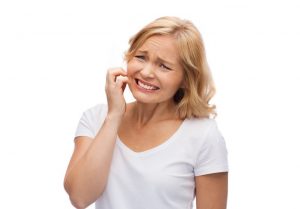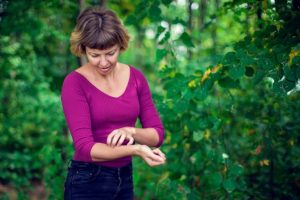
Pruritis or itchy skin, is the word used to describe the feeling of itchiness and is defined as an unpleasant sensation that provokes the desire to scratch.
Overview
Hormonal changes in menopause not only can result in hot flushes and night sweats but also can be attributed to problems concerning skin. It is important that we realise that changes in hormone levels are the source of many symptoms and one of these is itchy skin.
Pruritis or itchy skin, is the word used to describe the feeling of itchiness and is defined as an unpleasant sensation that provokes the desire to scratch. Changes in the skin caused by menopause can often be traced to this condition. Other changes can be changes to the pigment in the skin, acne and wrinkles. The feeling of itchiness varies in intensity and can be mild or severe resulting in disruption to everyday life.
What Causes Itchy Skin During Menopause?
Decrease in the production of oestrogen contributes to developing skin problems.
Oestrogen is an important contributor to the condition of the skin and the resultant drop in oestrogen levels affects the production of collagen which is primarily responsible for the elasticity and support of the skin. Oestrogen decline contributes to dry skin and reduces the body’s ability to produce the necessary skin oil levels which are important in keeping the skin moist, resulting in dryness and itching.
Women may also experience other skin problems brought about by menopause such as crawling skin whereby women report a sensation like insects crawling under their skin. This condition sometimes referred to as formication can be associated with hormonal changes during menopause. Women also report symptoms of numbness or a tingling, prickly feeling on the skin.
It is important to understand that there may be other contributing factors to itchy skin such as diabetes, skin cancer, drug use and side effects of certain medications, low vitamin levels, hypothyroidism and even skin cancers.
The Typical Itching Experience
There are various symptoms reported by women going through menopause. Dry and itchy skin occur in the back, arms and legs, neck and chest. Women may also report skin rash, irritated skin and even miniature bumps on the skin.
Itchy skin is most likely to occur on your:
- Face and Neck
- Chest and Back
- Limbs
Other skin changes that may occur include acne, rashes, pigmentation and wrinkling.
Are you experiencing this symptom?
Take the questionnaire to determine if it may be a sign of menopause, and discover how we can help
What Can I Do To Prevent Menopause Itching?
A healthy lifestyle can reduce the symptoms of skin itching. Things to avoid include:
- Smoking
- Long hot showers
- Over exposure to the sun
- Stress
- Late nights and bad sleep patterns
- Certain soaps and lotions that may cause irritation
Things that may assist include:
- Healthy diet rich in omega 3 and B vitamins
- Adequate daily water intake
- Sun protection
Treatment For Menopause Itching
There are a wide variety of treatment options for itchy skin ranging from home remedies to herbal supplements and prescription medication. It is important to speak to a doctor if you experience prolonged itching to rule out other serious medical conditions that may be the root cause.

There are a wide variety of treatment options for itchy skin ranging from home remedies to herbal supplements and prescription medication.
Home Remedies
Moisturizing Cream – Use a good quality moisturizing cream daily. This can help lock the moisture into the outermost layer of the skin and helps reduce dryness associated with skin itching.
Aloe Vera and Coconut Oil – Both of these are well known for their skin soothing properties. Aloe vera also has antibacterial, antifungal and anti-inflammatory properties which can help with rashes and soothing the skin. Fresh aloe vera gel would be ideal.
Oatmeal Bath – Colloidal oatmeal is an oatmeal that is made from finely ground oats. Oatmeal’s anti-inflammatory properties serves as an effective option in treating skin rashes and itching. Soak in a warm bath for 10 – 15 minutes.
Herbal Supplements
Phytoestrogens
Phytoestrogens are plant compounds with oestrogen like properties. The two classes of phytoestrogens are isoflavones and lignans. Examples are soy beans, flaxseed, whole grains legumes, fruit and vegetables. They appear to affect a low oestrogenic effect. This may have a positive effect on menopause symptoms like skin itching.
Macca Root
Macca is a cruciferous root vegetable that is grown in the high Andean plateaus of Peru. It has been used since before the time of the Incas for energy and is currently used both as a food and a medicine by the Peruvians. Macca is thought to have a stimulating and balancing effect – notably hormonal balance. Although the proof of effect is not convincing, many people do claim benefit for menopause symptoms when using it.
Medical Treatments
OTC Itch Creams
Plant based products like aloe vera or menthol may help with simple itches and provide a soothing effect.
Antihistamines
If the itch is allergy based, it is caused by the release of histamines. An antihistamine will counteract the effect of these histamines.
Corticosteroids
An anti-itch cream that contains at least one percent hydrocortisone is very effective way of treating an itch that is inflammatory or allergic in origin. It works by inhibiting the inflammatory response and will calm inflamed itch skin.
Hormone replacement therapy is a viable option in the treatment of episodic pruritis in perimenopausal women.
There is a rare cyclical premenstrual reaction to progesterone called autoimmune progesterone dermatitis that is recognised as occurring each month during the phase of the menstrual cycle leading up to a bleed.
Book A Free Medical Consultation
Speak with one of our doctors confidentially to discuss & if you are suitable a treatment plan will be prescribed.